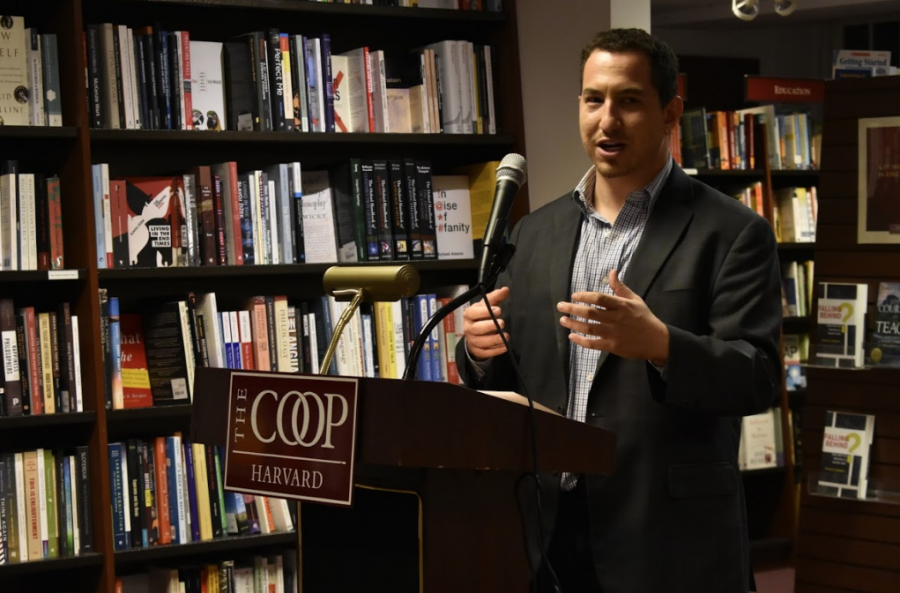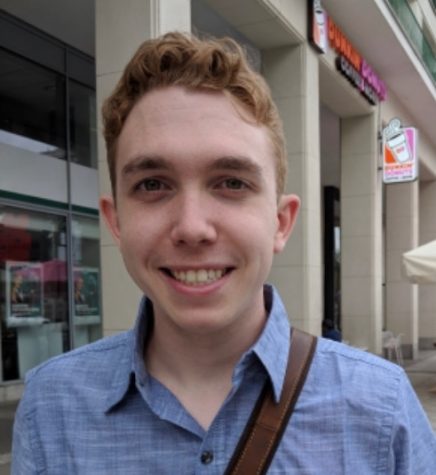On Thursday night, members of the Boston community gathered at The Coop in Cambridge, MA to hear Alexander Heffner discuss the newest updates to his book, “A Documentary History of the United States of America.”
Alexander Heffner, also known as Heffner Jr., a Harvard alumni, has continued the work of his late grandfather, Richard Heffner Sr., by publishing the tenth edition to his grandfather’s book, with the first edition of the anthology being published in 1952. This new edition saw the inclusion of modern populist events, including Bernie Sanders’ victory speech, Mark Zuckerberg’s Facebook posts, President Donald Trump’s tweets and inaugural address and how they threaten America’s democracy.
To relate his grandfather’s ideals to the present, Heffner Jr. felt the need to include Trump’s presidency in his books.
“It is regrettable that the history of men with more serious purposes sort of rest alongside someone we consider to be less serious,” said Heffner Jr. “But sometimes reality and history are regrettable too.”
In his presentation, Heffner Jr. discussed the state of democracy in America along with what he called the “growing disinformation crisis,” an ongoing issue in American news where unbiased facts can be increasingly difficult to find.
With a focus on how society can look back into history, Heffner Jr. said that he hopes his new edition will promote an influx of new ideas that will help “[society] return to normalcy in humane speech and a well versed discussion.”
The audience was mixed in their purposes of attending the talk, as the work of both Heffner Jr. and his grandfather has inspired all different backgrounds to voice their reactions to the current political waters and their effects on society.
John Avi Socha, a recent graduate of the University of Washington with a degree in Economics and Public Policy, worked with Americorps for several years including a stint in Italy.
“I am more interested in figuring out what is it about history that can show us how to avoid this [current political climate],” said Socha in an interview with The Suffolk Journal.“Which is exactly what this [event] was about. What was it about this day and age that led us here, because clearly we missed the warning signs, this doesn’t come out of nowhere.”
The Heffner family has always prioritized talking about major political events. In 1956, only four years after the release of his book, Heffner Sr.’s first episode of “The Open Mind” was released on PBS. With special guests like Martin Luther King Jr. and Malcolm X on “The Open Mind”, Heffner Sr. did not shy away from contentious social topics.
The show aims to allow guests to answer relevant intellectual questions and to take as much time as needed to complete their thought. Heffner Sr. felt this stands in opposition to the news media’s habit of seeking only sound bites from their guests and not hearing what they really have to say.
Upon his grandfather’s passing, Heffner Jr. chose to continue his grandfather’s work on the show by becoming the new host of “The Open Mind” as well as writing for a multitude of major news outlets like The New York Times, The Boston Globe and many others according to Heffner’s website.
As a Harvard graduate and Harvard faculty alum, Reverend Ellen Froth had a vested interest in hearing Heffner’s ideas and their effect on the community. Froth came to listen to Heffner Jr. speak because she had heard him on NPR a multitude of times.
“It’s important to be informed,” claimed Froth in an interview with The Suffolk Journal. “[The youth] feel as though no one is listening to them and that their needs are not important.”
Heffner Jr. made it clear that he believes in order for young people to understand the world that they are living in, they will need to look back at the history of our country.
“There can be no more important task than understanding the present,” said Heffner Jr. “The way we understand what just happened from the threats of disinformation.”
But spreading awareness isn’t Heffner’s only goal by continuing his grandfather’s work. He also works to insure his anthology covers what most textbooks can’t; media history. FDR’s fireside chats, the 24 hours news cycle and Twitter have all impacted the way America intakes news, something Heffner Jr. believes can not be understated.
“To me it is important to identify a way to speak truth to power in the present,” said Heffner Jr.
With the insight that comes from his time at Harvard and his grandfather’s work, Heffner Jr.’s understanding of American history and analysis of Trump’s presidency is extensive and thorough.
Heffner Jr. told the Journal, “I think the ideological pendulum swings back and forth a lot.”









